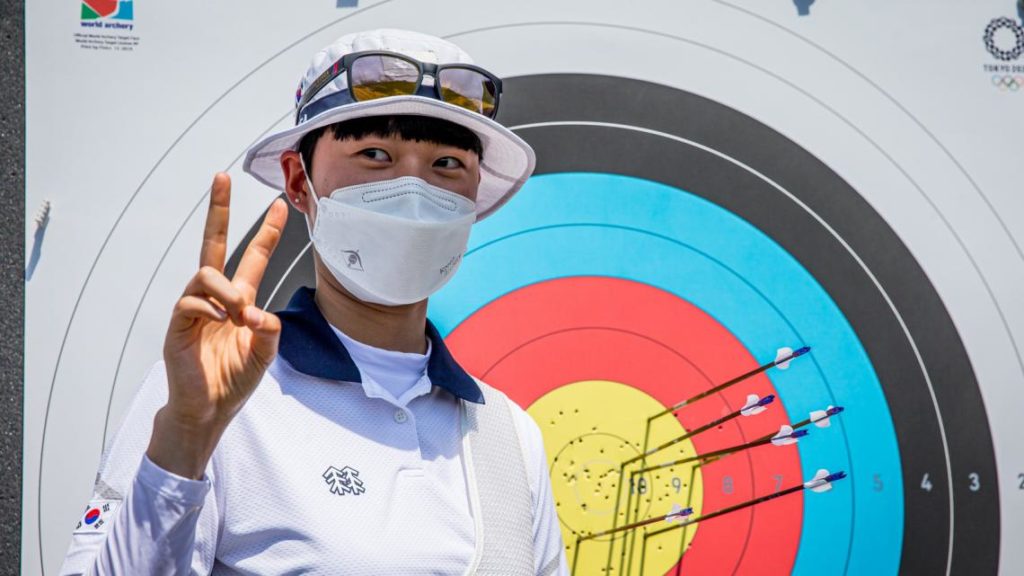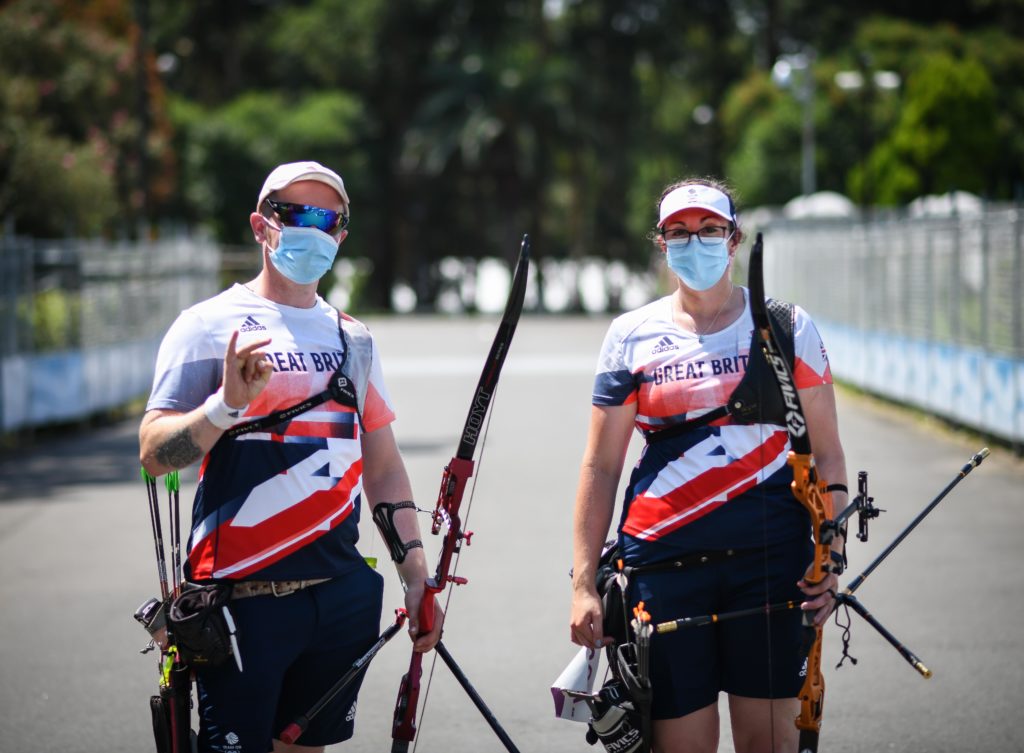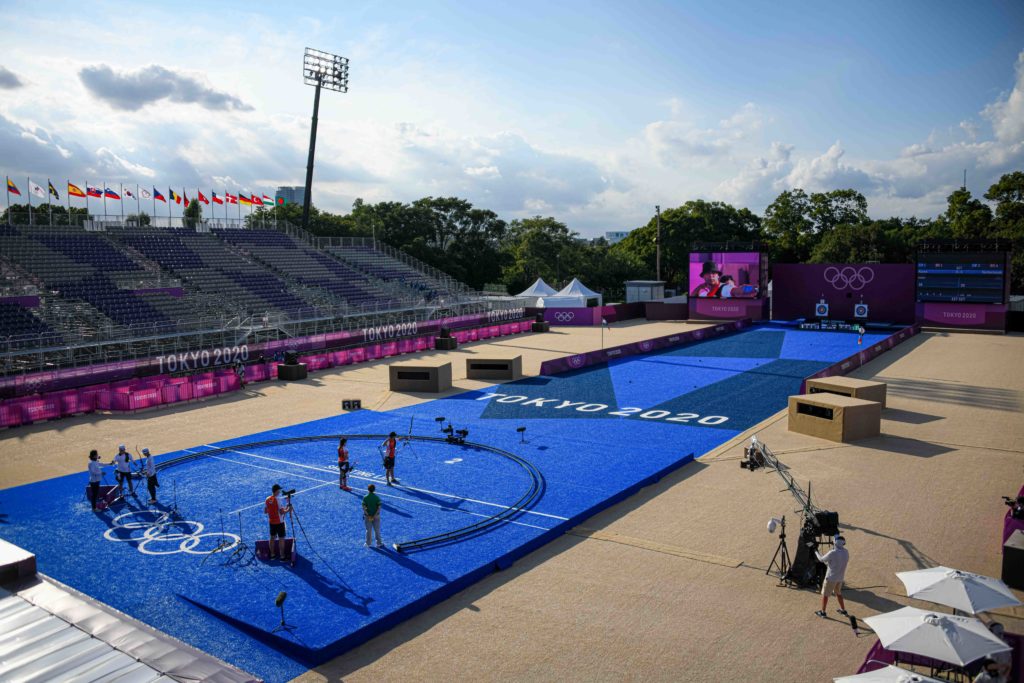
With the world’s sports press mostly stuck by government edict in Tokyo hotel rooms, there was a clear sense of relief when Friday eventually rolled around and competition started; the fears that the whole thing would somehow fall to pieces never quite left the building. Apart from some pool football matches, as usual, archery kicked off proceedings on the Friday morning and afternoon of the opening ceremony, with 64 men and 64 women taking the field. The women were up first, and despite some pre-match excitement, no world records were threatened, even if the 25 year old Olympic record of Lina Herasimenko (a score of 673, shot at Atlanta ’96) was finally obliterated by An San of Korea, who qualified top and got a golden ticket to the mixed team competition the next day. (Her best in practice is apparently a men’s record equalling 702).
Also as usual, the world’s media descended on the unglamorous hurdle that is the ranking round in spades. Much had been made of the heat and humidity of Japan in summer in the buildup, and it didn’t disappoint. Over 78 photographers and 86 journalists were crammed nose to tail (not *quite* as socially distanced as everyone might like) in the venue media centre with the air conditioning screaming to keep up. At least your scribe had air conditioning; the biggest news of the morning was Russian archer Svetlana Gomboeva keeling over in the middle of the field at the conclusion of the women’s qualification in the morning. It made headlines across the entire world; fitting the ‘troubled Games’ and ‘it’s too hot’ narratives perfectly – even if she got up and walked away a few minutes later with some ice on her head. Teammate, doyenne, and talisman of the Russian team, Ksenia Perova, growled “Everything is fine with Sveta now,” to Reuters, but the story was already out.
As the heat haze cleared, the results came in; determining the seedings and the fate of all five competitions (you can check the full results here yourself). The top eights individually weren’t too surprising, but it was more interesting to see who hadn’t really shown up to the party: the much-discussed Chinese Taipei women’s team qualified in a disastrous seventh place, with multiple-bridesmaids mainland China in 5th. Who had shown up? The USA women, qualifying a superb third, and hosts Japan in fourth in both men’s and women’s. Japan had been somewhat forgotten about in the media rush before the event, and gave themselves an excellent chance to maybe take something home. As the press wandered off to the downgraded opening ceremony, archers took stock for the week and the field cooled off. Until the next morning.
On a blazing Saturday with the thermometer hovering in the mid-thirties all day long, sixteen pairs from sixteen nations got to try their luck in the main arena for the mixed team competition; chosen from the top scores from the ranking round and ultimately permed from a possible thirty possible pairings who shot yesterday. Great Britain opened well against the rather more fancied China, but then shot indifferently against Mexico to leave at the quarterfinal stage. Taipei’s troubles continued as they exited quickly to India; Germany and Russia left quickly, as did a woeful Italy, and perhaps the biggest shock of all: the USA going down to a tightly-wound Indonesia, who impressed in Paris and again today. Brady left the mixed zone with a breezy ‘I’ll try not to smash something’.

The Netherlands pair of Steve Wijler and Gabi Schloesser came through their quarterfinal shootoff against, as Wijler’s first magnificent ten booted open a door which France couldn’t close. The Dutch then faced a tense Turkey, shooting Mete in and Mete out. They seemed well-matched, the first two sets going 36-35, but Mete wobbled at in end three – literally, as the winds started to pick up – but Yasemin managed to pick up the pieces. Mete looked sharper in the fourth, like he could shoot for ever. But in the end, Gabi only needed a nine with the last to split the points and take the set, and the match, and a guaranteed Olympic gong.
A gold medal match with Korea beckoned, but first, Turkey had to go straight back out and face a confident Mexico – at least until Luis Alvarez posted a two in the second end. But Valencia pushed Mexico back to the top of a wave, and they coasted into a fourth. Both teams were revved up by now but an appalling five from Anagoz handed Mexico Olympic bronze on a plate and sent Turkey home in fourth. That five that will be probably be haunting her for the rest of her life. It was Mexico’s first medal since London 2012 and the famous double podium for Mariana Avitia and Aida Roman.
The final would be a historic medal for all: the first ever mixed team Olympic gold. For the Netherlands, going in with a silver was already a great result, the first Dutch Olympic medal since Wietse van Alten in Sydney 2000, and the first archery team medal since 1920. The field was at least busy with press and noisy teammates, and the full production helped it not feel completely empty.
Of course, it seemed like Korea would cruise to victory. But the oranje opened with a 38 to a twitchy Korean 35. The noisy delegation in white in the east stand suddenly seemed subdued. Suddenly, we all wondered. It took a furious, vocal performance from Kim Je Deok – louder even than Park Chaesoon – to drag the match back to level terms. The Dutch kept fighting, but a six from Wijler, otherwise so strong at the business end of this tournament, sank the third, and it was 4-2 to a roaring Korea – even if An San didn’t seem to quite have the killer instinct to go with the metronomic timing.

The Netherlands opened the fourth with a 9, 10. Korea replied with two tens. Then Wijler and Schloesser stepped right up with two tens and a total 39; the sort of statement that says “we’re going to a shootoff”. Schloesser’s ten, under immense pressure, deserves special applause. But Je Deok stepped up and got it done. An San needed a nine, and a nine is what she got. It was enough. Asked about the match afterwards, Je Deok told a bemused set of reporters the Cantona-esque: “Yesterday I had a dream, and there were several snakes in my dream. I thought it was an auspicious dream.”
The mixed team competition, long-mooted and finally complete, ultimately delivered what the international federation and the IOC wanted: a wider diversity of nations involved, a very public commitment to equality, and something actually new. So much so that IOC president Thomas Bach turned up to watch and help hand out the inaugural gongs. It also broke the ice on an Olympic competition in the most trying circumstances. Tomorrow the ‘regular’ team events, all so laden with history, will begin.
So many international archery narratives end the same way: “but in the end, Korea triumphed.” The great white sharks were not as crisp and not as mean as they could have been. It didn’t feel like a foregone conclusion. But even if the talent was raw, it had enough edge to get the job done. A frankly tense afternoon in the Korean camp had been averted. So many times, there have been questions asked, but somehow, Korea always seem to have the answers.
The competition continues tomorrow with the women’s team event.
World Archery has extensive coverage of the event on their website and Facebook page.

